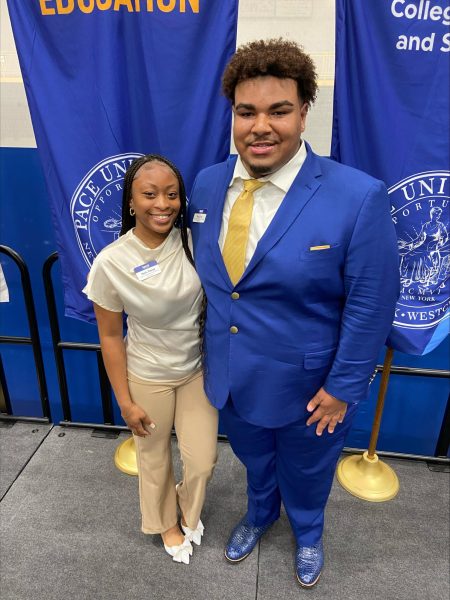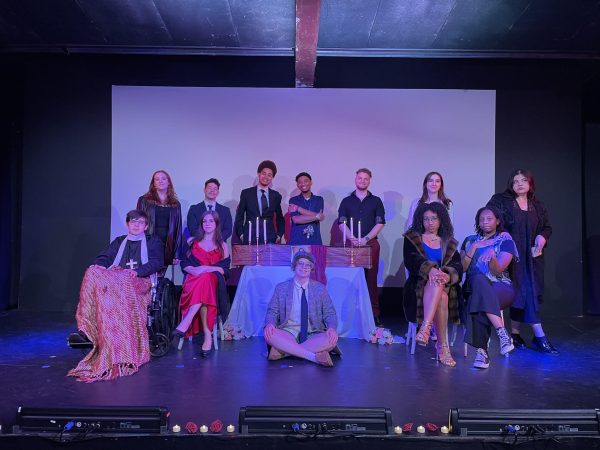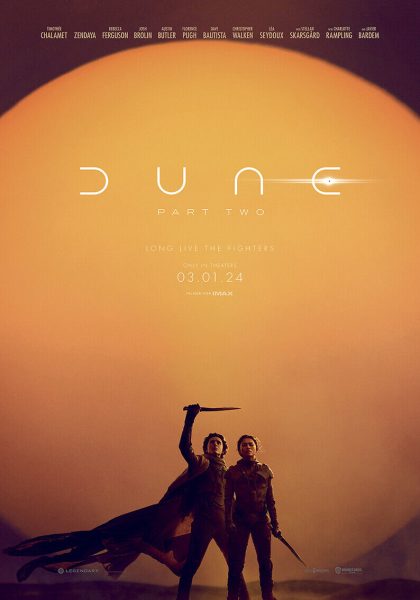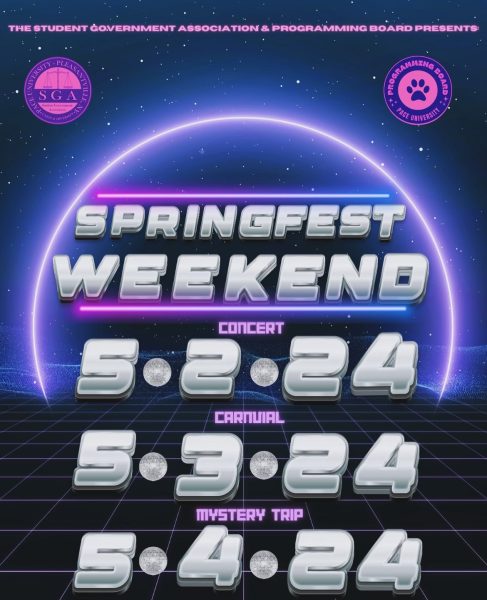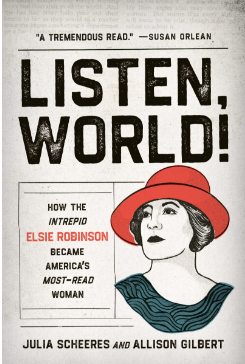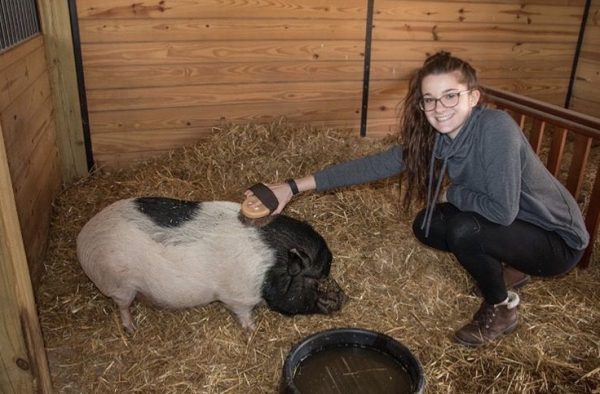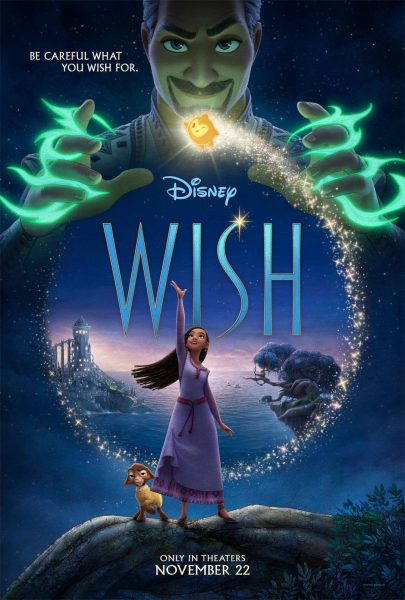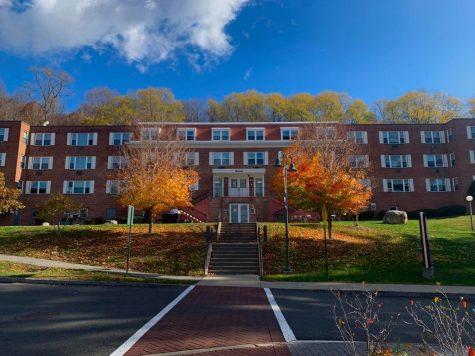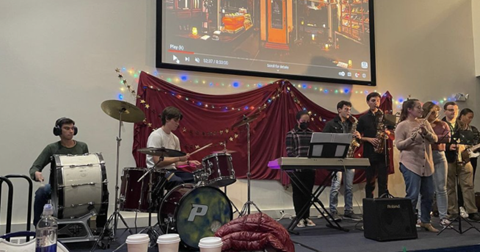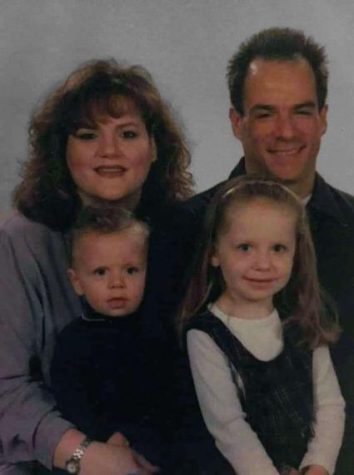Dyson Society of Fellows Celebrates What College Is About

Dr. Iacullo-Bird delivers awards at the end of the Society of Fellows Meeting at Pace’s New York campus. Photo by Carlos Villamayor/The Pace Chronicle.
April 7, 2016
Spending a Sunday among your professors and fellow students may not sound ideal, but when the occasion is a coming together of students and faculty to celebrate the richness and depth of their work, you might get much more than what you expected.
The life of the mind is indeed anything but dull, as the Pace community proved last Sunday at the 35 Annual Meeting of the Society of Fellows of Dyson College of Arts and Sciences, where students presented the fruits of their research work in a diversity of disciplines that touched on an even richer variety of topics and interests.
The meeting began officially after a light breakfast at the Bianco Room of One Pace Plaza, with addresses from Dr. Maria Iacullo-Bird, Assistant Dean for Undergraduate Research, Grants, and Special Projects of Dyson College; and Dr. Nira Herrmann, Dean of Dyson College.
After their welcome it was time for the Plenary Session, a series of presentations that celebrated, in a nutshell, the variety of a university’s academic pursuits. There was economics, history, science, and theater. The session included “The Mark of the Bees,” a presentation on bees and the various health-related uses of their products; Creating Nonagenrians, a play that caught the audience off-guard and made them reflect on time, friendship, and life; and presentations on retirement savings and the history of transgender people at the Stonewall riots.
Iacullo-Bird said the event was a showcase of excellence and the recognition of the accomplishments of students and their mentors. In most cases, students would take work or ideas that began in their courses and develop them for the event, according to her.
“This is what college is about,” said Iacullo-Bird in reference to the transformative experience of learning.
She went on to say that the event, and the Society, supports students both by encouraging their work if they are thinking of going to graduate school and by preparing them for the skills necessary in real work experience.
The rest of the day included a poster session and approximately 29 panel sessions divided in two groups—all consisting of student work. These latter sessions focused on topics as diverse as perspectives on education, class, and the environment; human struggles in the short story written form; analytical chemistry; international economics; Japanese terrorism; and aesthetics and psychology.
Sophomore Daniel Citardi was part of the poster session, where he showcased the project he worked on after taking Intergenerational Computing and volunteering at The Osborn, a senior living community in Rye, NY.
Citardi said he had gone there expecting to teach them the “cool” features of the Internet, but actually had to start from square one. There he also discovered how sounds influenced people dealing with dementia and Alzheimer’s. This led him to develop SoundBound, a sound therapy project and “something for caregivers to implement with their elderly patients,” according to Citardi.
“This was a really cool experience,” Citardi said. “It was nice being able to showcase my research and learn from others at the event. This is going to keep growing, it will probably be my [Honors] thesis project.”
Citardi’s mentor, Associate Professor of Information Technology Dr. Jean Coppola, was there with him.
“We’re very fortunate and privileged that Seidenberg [School of Computer Science and Information Systems] is able to participate,” Coppola said.
Dr. Elmer-Rico Mojica, Assistant Professor in the Department of Chemistry & Physical Sciences, was one of a kind. He was perhaps the professor who mentored the most students out of the entire faculty present at the event—his name figured next to no less than 11 students in the program. However, he credits this output in part to his students, as he said seniors help train their fellow juniors.
Mojica said a liberal arts education is incomplete without the empirical background the sciences provide. He further mentioned Pace’s motto, Opportunitas, and said he tries to be and provide just that for his students.
He said students who present at a Fellows’ meeting then go on to other conferences, more prepared for the real world. Mojica then cited the example of a student who that same day was leaving for a conference in San Diego.
Beyond the joy of working alongside students, for Dr. Robert Mundy, Assistant Professor of English & Modern Languages, it was nice to see papers that exist beyond the class.
“These are concepts, ideas that—no matter the reason—students didn’t see as something that was done and over,” Mundy said. “[The students’ work] continued to grow, it didn’t end when the semester ended.”
Mundy further said the Fellows Meeting was a point of contact between students, their peers, and professors where opportunities may result in other opportunities, such as student-faculty collaborations. But when all is said and done, Mundy reflected, the event was about one community of learning that transcends the classroom, degrees, and majors.
“We compartmentalize, in departments, majors, disciplines,” he said. “This is about the moments when we break through.”




